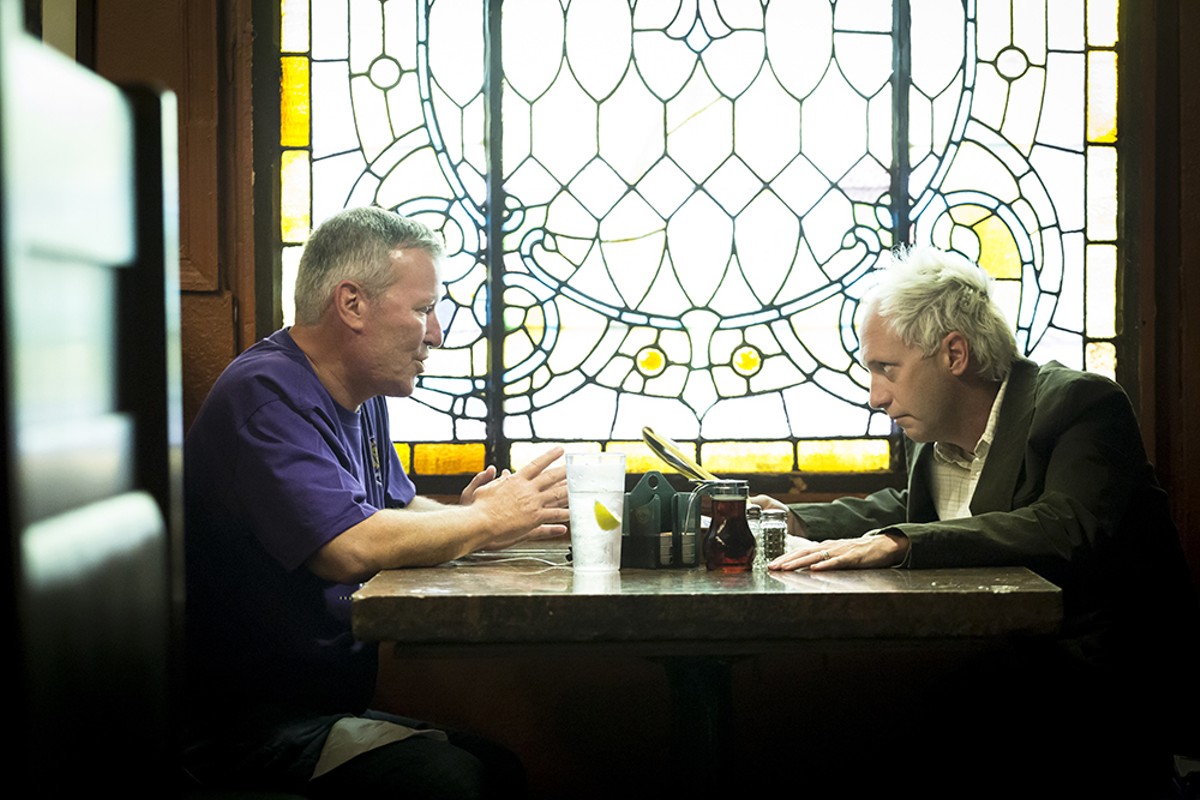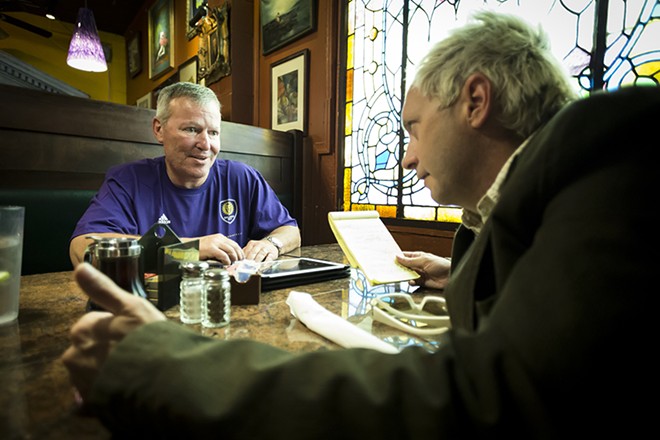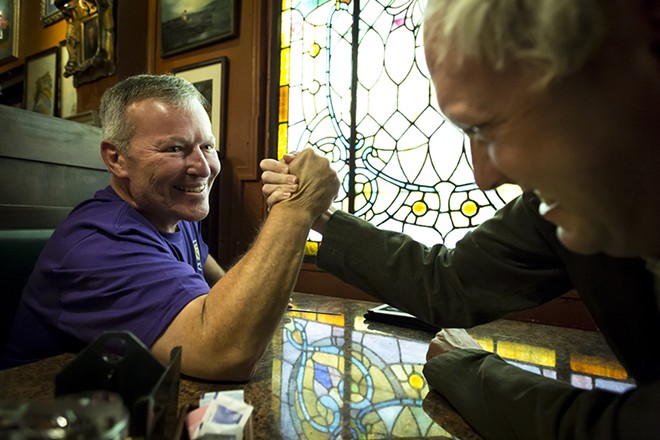"Talk loud. From a young time in my life when I used to shoot guns, I had a little bit of – well, I still shoot guns – I had a little bit of ringing in this ear, and this is exactly the worst ambient situation for me," says Orlando Mayor Buddy Dyer, who might or might not be in the proximity of a Saturday morning bloody mary.
"I'm really good at talking loud!" I reply.
"I know! Especially when you've had a couple of drinks," he says, watching me tug from an old-lady Baileys Irish Cream on ice.
A face is made.
"No, I'm not going to let you kiss me," he says.
"He's tried, he's tried," he insists to his accompanying aide for this, our mock exit interview, at White Wolf Café. "Actually he's kissed me on the cheek, but he tried to kiss me on the lips."
On June 16, the same day that Dyer kicks off his campaign for a fourth term as the arbiter of all things Orlando, I am leaving the Orlando Weekly to become editor-in-chief of local LGBT magazine Watermark. He's been mayor for 12 years, and I've been nipping at his heels for nearly all of them. We've been around the block together: He's cornered me, I've cornered him. Some parting words (and maybe some drinks) were in order.
Orlando Weekly: I guess we have to talk about the soccer stadium deal that postponed our meeting yesterday and made me work on a Saturday (For those who haven't been following the news, Dyer and Orlando City Soccer Club made a surprise announcement on May 29 that the club would privately fund the construction of its new downtown soccer stadium, rather than attempt to convince the state Legislature to cough up $30 million to help finance the project). Seems like an out-of-the-blue, fortuitous bit of legacy-making?
Buddy Dyer: Well, I think it's another success along the path that we're following these days. But it's a huge deal, the culmination of a process in which we've had at least three different deals put together: The $85 million deal with the county, then we had $110 [million] with the state funding, so it's evolved into a win-win-win for both the city and Orlando City. ...
I got a text message from Phil [Rawlins, Orlando City Soccer Club co-owner] while we were at the beach in Naples on Saturday. Phil said, "Hey, can I buy you a drink on Monday?" So, I didn't even check what it was about, and we ended up at the Alfond Inn, and we had a couple of drinks, and I actually anticipated that they had an idea about how we might fill the $30 million hole that the Legislature might create for us. Instead, he laid out the idea that they would pay for the entire stadium and buy the land from us and pay for stormwater relocation. He said, "I know you'll need time to think about it." And I said, "Yeah, a millisecond." So we consummated it ...
Wait, did you consummate it with Phil Rawlins?
Well. We memorialized it. I learned yesterday that they had a board of directors meeting a couple weeks ago, so the team and owners had been talking about it for a couple of weeks. Our first conversation was on Monday and we were able to do the deal by Friday. So, I'm really proud of our city team in being able to turn that around. There was a lot of behind-the-scenes stuff, because we still had – some of the property was subject to eminent domain – so we had to work around that.
Do you think the city would have turned a profit if it had invested in something like a new Major League Soccer stadium?
Well, I like owning and operating the facilities, because that gives us a lot of control over what goes on in the facilities. And it also allows us to put activities where they need to be, so that's the only downside – that they're going to build and operate their facility. But when they pay for the whole facility, when they pay for the land, it's a little hard for me to bargain for us to own the stadium, so that would have been ridiculous. When we operate a facility, we just try to break even, a little better. So the original deal when we were going to own and operate, they would have made up any operating deficit that the city had. Our operation of venues is not for a profit-making reason. It's to provide an amenity for our citizens and our visitors.
After watching the soccer press conference – when you speak of Pathways for Parramore, your early campaign promise (with former Commissioner Daisy Lynum) to address the blight on the west side of town in the predominantly black community, and how it's evolved from residential development to entertainment complexes and arenas – do you want to respond to the cries of gentrification that are going on?
It depends on what your definition of gentrification is. Just because there has been slum rental housing there doesn't mean that it has to remain slum rental housing, if we could upgrade the neighborhood. The residents of Parramore deserve to live in better conditions than they have in the past. I don't necessarily call that gentrification just because you're improving the neighborhood.
We do have Division Road, though, the proverbial other side of the tracks that unpleasantly demarcates the racial divide in Orlando.
It's odd because of where it is, exactly. But once upon a time there was no I-4, so there was buildings and housing where I-4 is, and Division Road was truly the demarcation between one side where African-Americans lived. ... I don't know who named it Division Road, but that was the dividing line.
OK, exit interview time. Let's talk about you and me and some of the issues that we've covered over the years that I've been at Orlando Weekly. First, the broad-ranging LGBT rights battle in Orlando – you've been pretty progressive on that, from Chapter 57 through the domestic partnership registry and to the mass marriage ceremony at City Hall in January.
It's an issue that's critical to the long-term success of our community, to be viewed as an inclusive, diverse, tolerant city that embraces fairness and equality. It's the right thing to do, in terms of morally right. But it's also the right thing economically as we try to attract the brilliant young people who want to live in a community of that type. ... You've probably heard me talk about Richard Florida – he's the economist who talks about how cities are going to be successful in the future, and it's by being that type of city.
So, City Council, which I've covered for an eternity, is really boring, am I right?
I go to my happy place. Like when [Commissioner] Sam Ings is giving his district update, I go to my happy place.
Next up, the Creative Village project. Last we heard, it was going to be a sort of 24-hour techie wonderland that looked like an overpriced rendering. Where is it going now?
I think the next 20 days are critical. We just broke ground on the BRT [Bus Rapid Transit via Lynx] for infrastructure, but we are likely to get a significant piece of funding from the Legislature in the next 20 days for the UCF-Valencia joint-use campus, and that will be a catalyst for explosive growth. Think about bringing 10,000-15,000 young people into downtown. That is what we need to start this. That's always been a long-range plan. That's a 10-year development and the recession hurt us badly there, because just as we were ready to move forward, things went south in terms of the economy.
Why is everything always about downtown, though?
I think the media focus on some of the biggest successes were in downtown, but, every day in the neighborhoods – I can't tell you how many parks and community centers we've invested in, we pick up 500,000 garbage pick-ups every week, 99.9 percent of the time on time, we fix potholes within 24 hours of hearing about them. I think we have some of the best city services in the country. But that's not the sexy stuff. ... You're not going to be writing about that; you're going to be writing about the MLS stadium.
I think we need to discuss former boy-band magnate, current convict Lou Pearlman and his golden deal with the city in 2003 for a big Church Street development that misfired.
Lou Pearlman, now there's a blast from the past. Well, he was going to bring his headquarters down there and a whole bunch of different stuff. But, if you'll recall, two things about that: One, that deal was struck under [former Orlando Mayor] Glenda Hood, and I basically unwound that deal, and we never paid him a penny, because it was an incentive-based deal, and they never met any of their benchmarks, so I had a major fight with – not Pearlman, he was just a nice guy – but his partner Robert Kling, and we had a knock-down drag-out with him. They never lived up to the agreement, and they wanted me to modify the agreement, and I wasn't going to do that. It was at the same time that we did the Plaza deal [with also maligned developer Cameron Kuhn] and they were jealous, I would say, of what we were doing over there. ... Bottom line is, they never lived up to the agreement and we never paid any of the incentives.
Speaking of the Plaza development, and Church Street, and Cameron Kuhn, didn't he just run away from his deal?
From our perspective on the Plaza deal, a lot of people think Cameron got the bad end of that and went broke. From our perspective, again, every bit of the loans that we made, they paid off early. And we never cared if the development was going to make money; that was on the tax rolls. That was a blighted block; you remember Terror on Church Street and what that was. Remember when I was talking about UCF being a catalyst for the redevelopment of downtown. And also what it did for me and the city is it showed other developers and people that were willing to invest money, the mayor is a man of his word. If he says we're going to do this, we're going to do this. And he's going to use his political capital to make this downtown a truly world-class downtown, so I think a lot of people might realize that I took all of the political heat for doing that, but I spent my political capital to get things done.
You were (and are) sort of the developer among mayors, though.
Developers are people who spend money to make your city better. And that's another thing: The Plaza generates so much tax money for the Community Redevelopment Agency that we're able to do other things based on the revenue they generate. There were lawsuits, but, again, the building is there and there are tenants and residents and a movie theater – everything we wanted.
On a lighter note, what was this mysterious fad diet thing that the whole city staff took part in that turned them into skinny people? Was there something in the water?
That was four years ago and I lost 35 pounds and I've been able to keep that off for four years. And when I weighed in today, I was one more pound than I was in high school.
How much is that, though?
199 pounds. I get up at 6:30 a.m. to work out. The coolest thing is that I get so many people that say they were inspired to lose weight because I did.
The future for Buddy: It's already being whispered that you are weighing a run for higher office in 2018.
I will give you an exclusive: In 2015, I'm going to run for re-election as mayor. I have the coolest job there is. I don't know if I would want to be governor instead of mayor of Orlando, because I can sleep in my own bed every night, I can see the changes I have made, and how much fun would it be to be a Democratic governor within this Republican Legislature?
Very fun, actually.
Seriously, you would be in charge of appointments and that's about it.
There were issues earlier this year with Tinker Field that put you at odds with some of the community and at least one commissioner. [Commissioner Patty Sheehan allegedly said she was threatened on the issue by the mayor's staff, but later retracted the comment.]
We did what we needed to with Tinker Field. [Dyer and the city commission voted to memorialize the historic baseball field attached to the Citrus Bowl with a plaque earlier this year, but decided to demolish its grandstands, rendering it useless. He's quiet on the topic.]
Are there any questions that you have for me?
What's your favorite moment of covering me?
Well, there was that time I was out of town and in Council Watch, somebody covering for me called you a Russet potato, but I can't take credit for that one. Generally, my favorite memories of covering you are when you try to shut people on the dais up. That, and watching you grimace at your critics.
Before you go on with that, I get more crap from the left wing of the Democratic Party than I do from Republicans or the mainstream. Basically, they believe that I should have come into office and not talked to any Republicans, have a whole Democratic administration, and that's not my nature. I'm inclusive and try to work with whomever the best people are to work with.
In fact, who are the people who ran against me in my first campaign? One of them became my first city attorney, Wayne Rich. Tico Perez is on the Orlando Utilities Commission. Bill Sublette I made chair of the Mayor's Task Force on Education. I didn't do anything with Pete Barr.
What do you think about partisanship in municipal elections?
Let's keep going with how I've evolved.
Well.
You even invited me to your wedding. ... I have pretty thick skin, and I understand the role of the media. What is your proudest career achievement with Orlando Weekly?
I'd have to say it was my coverage of Medicaid expansion and the sort of national repercussions, putting a face to Tallahassee's irresponsible folly. Second proudest would probably be when I was able to open up about the importance of gay rights via my own personal life and the loss of my partner, Alan. Also, gay marriage is legal now. Speaking of me, how did you feel about your indictment and the special election – the one that never happened – in 2005? How did you feel about me running to replace you? [Dyer was accused of paying people to collect absentee ballots illegally by a special prosecutor; he was quickly exonerated and reinstated, but only after ballots for a special election were printed. That was the year I launched my own Billy Manes for Mayor campaign.]
Well, I wasn't thinking much about you running at all! ... The state attorney misinterpreted the election law that I was a part of enacting. That was about 40 days and cost about $300,000 in legal fees.
But I seem to recall you saying you loved my floating-head campaign button, anyway.
If I was in the election with you now, I would really be scared.





















